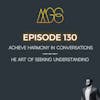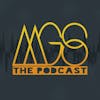The Five Reasons You Might Be Exhausted (And How to Fix Them)
If you're feeling frustrated because you can't seem to find ways to reduce stress and live a healthier lifestyle, then this episode is for you! You will learn the five reasons why you may be feeling exhausted and how to fix them.
Here's a breakdown of what is covered:
[00:00:00] - Welcome to the show.
[00:00:41] - Why you might be exhausted.
[00:08:00] - Why your sedentary lifestyle might be exhausted.
[00:09:38] - Quick requests for viewers.
Chapter Summaries:
[00:00:00] - Motivate Grind Succeed podcast is back! The show helps improve your life in the four foundational pillars faith, Fellowship, Fitness and Finance. If at any point in this episode you get some value from this episode, I want you to share it with just one person.
[00:00:41] - This week's episode is going to be about why you might be exhausted. This week we're going to talk about the five reasons why number one is not getting good quality REM sleep. Number two is stress. Number three is too much caffeine. Number four is imbalances in diet. Dietary imbalances can be caused by too much protein, too many carbs, too many fats, or too much sodium. Too much of anything that is giving an imbalance to your diet will prevent you from sleeping. Too much caffeine can also be a reason why you are not getting enough sleep.
[00:08:00] - The reason why you might be exhausted is because of a sedentary lifestyle. When I don't do my workouts, I usually have a lot of excess energy, and cannot go to bed and fall asleep easily. I have to make sure I depletes my physical and mental energy reserves.
[00:09:38] - This week's episode is coming to an end. Before the episode ends, he reminds people to subscribe to the show and follow him on social media. He also gives them 5 points to keep in mind before the episode comes to a close:. Sleep quality stress diet, caffeine, sedentary, lifestyle and stress.
Connect with me:
Instagram: https://www.instagram.com/motivategrindsucceed/
YouTube: https://www.youtube.com/channel/UCbWrAkF3BDdoQNVoZw-Erlg
Twitter: https://twitter.com/themgspodcast
Website: www.motivategrindsucceed.com
Merch
https://mgsmerch.fans
Loved this episode? Leave us a review and rating here: www.motivategrindsucceed.com/reviews/new
Support this podcast at — https://redcircle.com/motivate-grind-succeed-the-podcast/donations
Thrive or Survive...you can't do both.
[00:00:00]
Welcome, everybody. Welcome. Welcome back to another episode of the Motivate Grind Succeed podcast, the show that helps you improve your life in the four foundational cornerstone Faith, Fellowship, fitness and Finance, who practice technical tips and takeaways with every single episode. If you're new to the show, welcome, and I know you're going to get a ton of value from this week's episode. And if you're returning, welcome back.
[00:00:25]
You know, I missed all you guys. Quick favor, though, to all those who are listening. Whether you are new or returning. If at any point in time in this episode you get some value from this episode, I want you to share this episode with just one person. That's it.
[00:00:36]
Just share it with just one person so we can go ahead and share this wealth of knowledge. So with all that housekeeping out of the way, let's get started with this week's episode. And this week's episode, we're going to be talking about why you might be exhausted, right? Since we're going to be talking about that, as usual, I have my notes here on the right. I have you guys here on the left.
[00:00:55]
So we're going to go ahead and hop straight into the five reasons why I believe you need to address first as to why you might just be exhausted. And this all came from this past week of me at work. I've been absolutely just pure, plain old tired. And so definitely number four is the one that I put on here definitely from my own personal experience. So getting started.
[00:01:18]
Number one, not getting good quality REM sleep. What is REM? Sleep remains. Acronym for Rapid Eye movement. It's the period of sleep where your eyes actually vibrate back and forth very quickly.
[00:01:31]
You don't even realize it usually. And that is the time when your muscles and your tendons and your body actually is in its deepest state where the body is actually recovering. So believe it or not, when you're actually sleeping, a lot of times when you say you get your 8 hours of sleep, you probably actually slept slept for maybe more like six and a half hours because that was the time when your body was actually recovering and resting. And the best way to track this is to use your Apple Watch. To use your Galaxy Watch and do some sleep tracking because I've been doing that for the past few days and I've definitely found that even though I'll say.
[00:02:05]
Oh. I'm getting my 8 hours of sleep and I've been trying to get that at night. Realistically. I'm more getting like 5 hours and 55 minutes to 6 hours and 30 minutes when I'm actually when I think I'm asleep for 8 hours. So try to get more sleep and track your sleep and see how much deep sleep or motionless sleep, whatever your app calls it that you're getting.
[00:02:25]
Number two is stress. If you're too stressed, you're going to have problems getting to sleep. And this ties back into number one as well. If you're too stressed, your cortisol levels are too high. If your cortisol levels are too high, then your body is in more of like, that pre fight or flight mode.
[00:02:41]
And then there's no way for your body to really like, recoup recovery and say, okay, we're fine. When you're stressed, your body is in that, like I said before, that fight or flight survival mode. And that is when you're more like, oh, your body is wondering, okay, something could pop out of a bush. Something could happen here, something could happen there. And you're not really relaxed, able to go to sleep, right?
[00:03:00]
So now we're not back in the caveman days where you could be eaten by a trex or velociraptor or something, right? But we are in a period of time now where if you're working your nine to five job and things are really stressful at the job, it could be more of a, oh my gosh, I'm so stressed. This needs to happen tomorrow to get this done by next week. And your brain sees that as the exact same thing as back from those olden days where you're wondering, something could happen to you whenever you feel like, and you're just like, oh my gosh, I don't know. And because you don't know what's going on, and because you're trying to formulate these things to try to figure out a plan, your brain can't relax.
[00:03:35]
And because your brain can't relax, you have all this stress. And because you have all this stress, you can't sleep. It all comes full circle there. So try to deal with your stress headspace calm. Again, we're not sponsored by these things at all, but these are different applications that I've used in the past, and they do help out a lot.
[00:03:52]
So also meditation, if you want to be able to do that and just sit and just focus on breathing for like five minutes. I've noticed on this, when I'm really stressed, I can't even meditate for like 30 seconds, it gets so bad. So being able to understand how to be in the present moment, be able to understand how to bring yourself back and distress yourself, absolutely crucial. Number three, dietary imbalances. And actually number four as well.
[00:04:15]
We'll loop this one in as well, which is the point that I said is the one that really I noticed I was doing too much. Point number four is consuming too much caffeine. So these two kind of go together, right? So if you consume too much caffeine, that automatically means you kind of have an imbalance as there's too much of something in your diet. So we'll kind of cover these together here.
[00:04:33]
So dietary imbalances. When I say dietary imbalances, I mean anything that you eat in excess, right? You eat too much protein, too much carbs, too much fats, too much whatever else. You have too much sodium, put anything else that you want in there, right? Too much of some vitamin or anything.
[00:04:52]
Too much of anything that is giving an imbalance to your diet will actually prevent you from sleeping. This is why sometimes people will say do not eat between like two to 3 hours or so before bedtime. Because not only does your body have to work to digest the food and that takes time. But now imagine if you had an imbalance of something like too much protein and your body had to work even harder to be able to process all that protein that you've been eating. Now instead of it taking the 3 hours, it might take longer or your body might be just working harder during that time.
[00:05:23]
So you're not going to be able to fall asleep nearly as easily if you're doing that. One of the ways, like I said already, which you can have a dietary imbalance is having too much caffeine. I know definitely this week it's been a tiring week. I've had to been going down to work and it's been pretty tiring driving two plus hours each way. So it is very tiring to do that sometimes.
[00:05:44]
So sometimes I did have to depend unfortunately on caffeine to kind of get me up and get me moving and eventually become that person who's drinking caffeine throughout the day just to kind of keep yourself going. And when I found that I did that, even though I had to be up early, I found it was hard to go to sleep because the caffeine is in my system. So consuming too much caffeine might also be a purpose or a point as to why you are not getting enough sleep and why you might just be exhausted. It's because if you're consuming that caffeine, not only is caffeine a diuretic meaning make you go to the bathroom a lot, but the main point of caffeine is to inhibit the receptors in your brain that tell you that you are tired. That's what caffeine is for.
[00:06:25]
Which is why you feel more awake, or at least rather sometimes why you may not just feel as tired, you may still feel tired, but not as tired enough to go to sleep. Just knock a little bit of the tired off, right? That's what that's for. And so having too much of that you start to basically block your is literally like taking drugs, right? You start blocking the receptors and then you eventually have to go through your withdrawal symptoms if you want to get off of coffee.
[00:06:54]
I had a friend once who drank a ton of coffee. I mean, like they had a cup for breakfast and then a cup before lunch. A cup at lunch and then a cup before dinner, and then a cup at dinner and then a cup before bed. Like that was a typical day. And then they would always be exhausted.
[00:07:12]
And so one day we were just like nope, can't do it. Had enough. Had enough. And so then they decided to cold turkey with other people's help. They decided to cold turkey to doing one cup a day.
[00:07:22]
And the withdrawal symptoms that they experienced were off the chain for lack of a better term. Let me tell you, it was really bad. It was really bad because they ended up just being like, oh my gosh, I need my coffee, I need my coffee. I don't know how I'm going to survive without my coffee. And it was so sad to see, but I was like, that's how so many people technically can be if they don't have their coffee.
[00:07:47]
So that's why you might be exhausted. Getting too much caffeine in your system, not good for you. Every now and again, okay, that's fine, it's there, but all the time and creating a dependency, that's where the problem lies. Finally, we're going to move on to point number five, why you might be exhausted. It's a sedentary lifestyle.
[00:08:06]
Now, you all know one of the cornerstones of this channel is fitness, right? So sedentary lifestyles are like, it rubs me a little bit the wrong way. So because of this, this is why I put this as another point on the list here because I have found that when I don't do my workouts, I usually have a lot of excess abundant energy and I cannot go to bed and fall asleep easily because I have this extra energy, right? If you think of your body as having different tanks of energy, you have a mental energy tank, which also needs to deplete that I don't have to worry about because I already got my day job, I have the podcast and I have other stuff going on that I'm working on too. So my mental energy bank is fine when it comes to being depleted by the end of the day, but I have to make sure I also deplete that physical energy bank.
[00:09:02]
So if I don't do my exercise, this is still full. And so even if the mental one is down and the physical one is full, by the time I get to bed, I'm not doing anything. What happens? I'm still having trouble falling asleep because I did not deplete all of my energy reserves. So it actually becomes harder to do that.
[00:09:19]
You got to start depending on melatonin to try to help yourself get more restful, sleep and all the other kind of things. And just my thing, just nip the problem in the bud and get yourself some physical activity, guarantee you it's going to start making your life at least a little bit better. And not just in sleep, but just in general. So before we end, let's go back to these five points one more time for all the people who love taking notes like myself out there. Number one, you're not getting good quality REM sleep.
[00:09:49]
Number two, you have too much stress in your life. Number three, you're having dietary imbalances. You got to fix those, man. Four, consuming too much caffeine. And five, you have a sedentary lifestyle.
[00:10:04]
And guys, that is it for this week's episode. I'm going to bring this week's episode to a close. Thank you so much for tuning in today. But before you go, as usual, I have my two quick requests for you guys, and I promise you, it's going to take you less than two minutes to do number one subscribe. Follow to the show if you found it useful for you and be on the lookout for new episodes every single week.
[00:10:26]
And lastly, number two, guys, follow me on social media. You the links for that will be in this episode's description as they are in every single episode. Take care of yourselves and I will see you all next time. Bye.
New to Motivate Grind Succeed: The Podcast?
Here are some great episodes to start with. Or, check out episodes by topic.

















